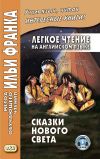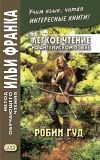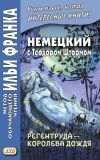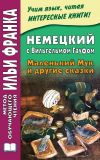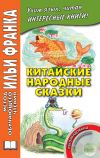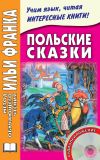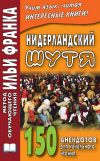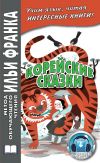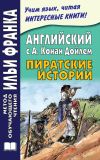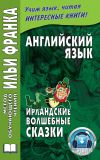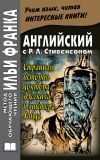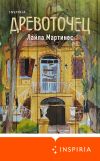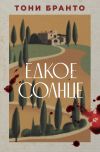Текст книги "Английский с Шерлоком Холмсом. Человек с рассеченной губой / Arthur Conan Doyle. Sherlock Holmes"
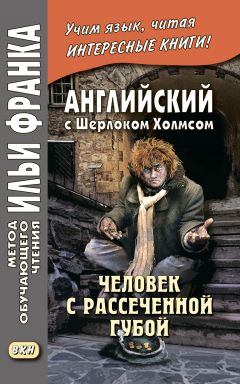
Автор книги: Артур Дойл
Жанр: Иностранные языки, Наука и Образование
Возрастные ограничения: +16
сообщить о неприемлемом содержимом
Текущая страница: 15 (всего у книги 21 страниц)
husband ['hʌzbǝnd], clergyman ['klɜ:ʤɪmǝn], fortune ['fɔ:ʧ(ǝ)n]
“Frank wouldn't throw up his hand, though; so he followed me there, and he saw me without pa knowing anything about it. It would only have made him mad to know, so we just fixed it all up for ourselves. Frank said that he would go and make his pile, too, and never come back to claim me until he had as much as pa. So then I promised to wait for him to the end of time and pledged myself not to marry anyone else while he lived. 'Why shouldn't we be married right away, then,' said he, 'and then I will feel sure of you; and I won't claim to be your husband until I come back?' Well, we talked it over, and he had fixed it all up so nicely, with a clergyman all ready in waiting, that we just did it right there; and then Frank went off to seek his fortune, and I went back to pa.
“The next I heard of Frank was that he was in Montana (следующее, что я узнала о Фрэнке, было то, что он в Монтане), and then he went prospecting in Arizona (потом он уехал искать золото в Аризону; to prospect – проводить разведку, искать /полезные ископаемые/), and then I heard of him from New Mexico (а затем я услышала о нем из Нью-Мексико = узнала, что он в Нью-Мексико). After that came a long newspaper story about how a miners' camp had been attacked by Apache Indians (потом появилась длинная газетная статья о том, как на лагерь золотодобытчиков напали индейцы-апачи), and there was my Frank's name among the killed (и в списке убитых: «среди убитых» было имя Фрэнка). I fainted dead away (я упала без чувств), and I was very sick for months after (и очень тяжело болела несколько месяцев). Pa thought I had a decline (папа думал, что у меня чахотка; decline – падение; упадок /сил/; ухудшение /здоровья/; изнурительная болезнь, особенно чахотка) and took me to half the doctors in 'Frisco (и показал меня половине докторов во Фриско = водил по докторам Фриско). Not a word of news came for a year and more (больше года не было ни слова вестей /от Фрэнка/), so that I never doubted that Frank was really dead (и я не сомневалась, что он на самом деле умер). Then Lord St. Simon came to 'Frisco (затем лорд Сент-Саймон приехал в Фриско), and we came to London (мы отправились в Лондон), and a marriage was arranged (договорились о свадьбе), and pa was very pleased (и папа был очень доволен), but I felt all the time that no man on this earth would ever take the place in my heart (но я все время чувствовала, что ни один мужчина в мире: «на этой земле» никогда не займет в моем сердце место) that had been given to my poor Frank (отданное моему бедному Фрэнку).
half [hɑ:f], doubted ['daʋtɪd], earth [ɜ:θ], heart [hɑ:t]
“The next I heard of Frank was that he was in Montana, and then he went prospecting in Arizona, and then I heard of him from New Mexico. After that came a long newspaper story about how a miners' camp had been attacked by Apache Indians, and there was my Frank's name among the killed. I fainted dead away, and I was very sick for months after. Pa thought I had a decline and took me to half the doctors in 'Frisco. Not a word of news came for a year and more, so that I never doubted that Frank was really dead. Then Lord St. Simon came to 'Frisco, and we came to London, and a marriage was arranged, and pa was very pleased, but I felt all the time that no man on this earth would ever take the place in my heart that had been given to my poor Frank.
“Still, if I had married Lord St. Simon (однако, если бы я вышла замуж за лорда Сент-Саймона), of course I'd have done my duty by him (я, конечно, исполнила бы свой долг по отношению к нему). We can't command our love (мы не можем управлять своей любовью), but we can our actions (но своими поступками – можем). I went to the altar with him (я шла с ним к алтарю) with the intention to make him just as good a wife as it was in me to be (с намерением стать ему хорошей женой, насколько это было в моих силах). But you may imagine what I felt (но вы можете себе представить, что я почувствовала) when, just as I came to the altar rails (когда, подходя к алтарной ограде), I glanced back and saw Frank (я оглянулась и увидела Фрэнка) standing and looking at me out of the first pew (который стоял за первой скамьей и смотрел на меня). I thought it was his ghost at first (сначала я подумала, что это /его/ призрак); but when I looked again there he was still (но когда я оглянулась снова, он по-прежнему стоял там), with a kind of question in his eyes (в его глазах словно был вопрос = он будто спрашивал взглядом), as if to ask me whether I were glad or sorry to see him (рада я его видеть или нет). I wonder I didn't drop (удивляюсь, как я не упала в обморок). I know that everything was turning round (все кружилось /перед глазами/; to turn round – поворачиваться), and the words of the clergyman were just like the buzz of a bee in my ear (слова священника звучали в моих ушах, точно жужжание пчелы). I didn't know what to do (я не знала, что делать).
duty ['dju:tɪ], ghost [ɡǝʋst], clergyman ['klɜ:ʤɪmǝn]
“Still, if I had married Lord St. Simon, of course I'd have done my duty by him. We can't command our love, but we can our actions. I went to the altar with him with the intention to make him just as good a wife as it was in me to be. But you may imagine what I felt when, just as I came to the altar rails, I glanced back and saw Frank standing and looking at me out of the first pew. I thought it was his ghost at first; but when I looked again there he was still, with a kind of question in his eyes, as if to ask me whether I were glad or sorry to see him. I wonder I didn't drop. I know that everything was turning round, and the words of the clergyman were just like the buzz of a bee in my ear. I didn't know what to do.
“Should I stop the service and make a scene in the church (следовало ли мне остановить венчание и устроить сцену в церкви; service – служба; богослужение; marriage service – венчание)? I glanced at him again, and he seemed to know what I was thinking (я снова взглянула на него, и, должно быть, он понял, о чем я думаю), for he raised his finger to his lips to tell me to be still (потому что поднес палец к губам, /как бы/ говоря мне молчать). Then I saw him scribble on a piece of paper (потом я увидела, как он быстро пишет что-то на клочке бумаги), and I knew that he was writing me a note (и поняла, что он пишет мне записку). As I passed his pew on the way out (когда я проходила мимо его скамьи, направляясь к выходу) I dropped my bouquet over to him (я уронила букет возле него), and he slipped the note into my hand (и он незаметно передал мне записку: «незаметно сунул в мою руку»; to slip – скользить; давать /что-либо/ скрытно, незаметно) when he returned me the flowers (возвращая цветы). It was only a line asking me to join him (в записке была лишь одна строчка, /в которой он/ просил, чтобы я вышла к нему; to join – /при/соединяться) when he made the sign to me to do so (когда он подаст мне знак). Of course I never doubted for a moment (конечно, я ни на миг не усомнилась) that my first duty was now to him (что теперь мой главный долг относился к нему), and I determined to do just whatever he might direct (и я решила делать все, что он скажет; whatever – какой бы ни; что бы ни; to direct – направлять, давать указание).
scene [si:n], bouquet [bʋ'keɪ], flower ['flaʋǝ], doubted ['daʋtɪd]
“Should I stop the service and make a scene in the church? I glanced at him again, and he seemed to know what I was thinking, for he raised his finger to his lips to tell me to be still. Then I saw him scribble on a piece of paper, and I knew that he was writing me a note. As I passed his pew on the way out I dropped my bouquet over to him, and he slipped the note into my hand when he returned me the flowers. It was only a line asking me to join him when he made the sign to me to do so. Of course I never doubted for a moment that my first duty was now to him, and I determined to do just whatever he might direct.
“When I got back I told my maid (вернувшись /домой/, я все рассказала моей горничной), who had known him in California (которая знала Фрэнка /еще/ в Калифорнии), and had always been his friend (и всегда была его другом). I ordered her to say nothing (я велела ей не говорить ничего), but to get a few things packed and my ulster ready (а сложить кое-какие вещи и приготовить мне пальто). I know I ought to have spoken to Lord St. Simon (я знаю, мне следовало бы поговорить с лордом Сент-Саймоном), but it was dreadful hard before his mother and all those great people (но это было ужасно трудно в присутствии его матери и всех тех важных людей). I just made up my mind to run away and explain afterwards (я решила убежать, а объясниться позднее).
“I hadn't been at the table ten minutes (я не просидела за столом и десяти минут) before I saw Frank out of the window at the other side of the road (как увидела из окна Фрэнка, /стоявшего/ на противоположном тротуаре). He beckoned to me and then began walking into the Park (он кивнул мне и пошел в Парк; to beckon – подзывать кивком головы; манить, делать знак). I slipped out, put on my things, and followed him (я вышла из столовой, надела пальто и шляпку: «вещи» и пошла за ним; to slip out – выйти, выбежать /на улицу/; уйти украдкой). Some woman came talking something or other about Lord St. Simon to me (какая-то женщина подошла ко мне и стала что-то рассказывать о лорде Сент-Саймоне) – seemed to me from the little I heard (мне показалось из того немногого, что услышала) as if he had a little secret of his own before marriage also (что у него тоже до свадьбы была какая-то маленькая тайна) – but I managed to get away from her (мне удалось отделаться от нее; to get away – удрать; ускользнуть; освободиться) and soon overtook Frank (и вскоре я нагнала Фрэнка).
ought [ɔ:t], beckoned ['bekǝnd], marriage ['mærɪʤ]
“When I got back I told my maid, who had known him in California, and had always been his friend. I ordered her to say nothing, but to get a few things packed and my ulster ready. I know I ought to have spoken to Lord St. Simon, but it was dreadful hard before his mother and all those great people. I just made up my mind to run away and explain afterwards.
“I hadn't been at the table ten minutes before I saw Frank out of the window at the other side of the road. He beckoned to me and then began walking into the Park. I slipped out, put on my things, and followed him. Some woman came talking something or other about Lord St. Simon to me – seemed to me from the little I heard as if he had a little secret of his own before marriage also – but I managed to get away from her and soon overtook Frank.
“We got into a cab together (мы вместе сели в кеб), and away we drove to some lodgings he had taken in Gordon Square (и поехали в квартиру, снятую им на Гордон-Сквер; lodgings – сдаваемая комната; квартира), and that was my true wedding after all those years of waiting (и это была моя настоящая свадьба после всех тех лет ожидания). Frank had been a prisoner among the Apaches (Фрэнк был пленником среди апачей = побывал в плену у апачей), had escaped, came on to 'Frisco (бежал, приехал во Фриско), found that I had given him up for dead and had gone to England (узнал, что я посчитала его умершим и уехала в Англию; to give up – оставить, отказаться; сдаться, уступить; порвать /с кем-либо/; перестать ждать), followed me there (последовал за мной), and had come upon me at last on the very morning of my second wedding (и наконец разыскал меня как раз в утро моей второй свадьбы).”
“I saw it in a paper (я прочитал об этом в газете),” explained the American (пояснил американец). “It gave the name and the church but not where the lady lived (там было указано имя /невесты/ и церковь, но не сообщалось, где она живет).”
prisoner ['prɪz(ǝ)nǝ], England ['ɪŋɡlǝnd], American [ǝ'merɪkǝn]
“We got into a cab together, and away we drove to some lodgings he had taken in Gordon Square, and that was my true wedding after all those years of waiting. Frank had been a prisoner among the Apaches, had escaped, came on to 'Frisco, found that I had given him up for dead and had gone to England, followed me there, and had come upon me at last on the very morning of my second wedding.”
“I saw it in a paper,” explained the American. “It gave the name and the church but not where the lady lived.”
“Then we had a talk as to what we should do (потом мы стали думать, как нам поступить; to have a talk – говорить, беседовать), and Frank was all for openness (Фрэнк стоял за откровенность), but I was so ashamed of it all (но мне было так стыдно за все) that I felt as if I should like to vanish away (что захотелось исчезнуть) and never see any of them again (и никогда больше не встречать никого из них) – just sending a line to pa, perhaps (разве что написать несколько строк папе: «отправить строчку папе»), to show him that I was alive (чтобы дать ему знать, что я жива). It was awful to me to think of all those lords and ladies (я с ужасом думала обо всех этих лордах и леди) sitting round that breakfast-table and waiting for me to come back (сидящих за свадебным столом и ожидающих моего возвращения). So Frank took my wedding-clothes and things (Фрэнк взял мое свадебное платье и /другие/ вещи) and made a bundle of them (связал их в узел), so that I should not be traced (чтобы меня нельзя было выследить), and dropped them away somewhere where no one could find them (и бросил их в такое место, где их никто не смог бы найти). It is likely that we should have gone on to Paris tomorrow (вероятно, мы бы завтра уехали в Париж), only that this good gentleman, Mr. Holmes (вот только этот милый джентльмен, мистер Холмс), came round to us this evening (зашел к нам сегодня вечером), though how he found us is more than I can think (хотя как он нас нашел, выше моего понимания), and he showed us very clearly and kindly (и доказал нам очень понятно и мягко) that I was wrong and that Frank was right (что я ошибаюсь, а Фрэнк прав), and that we should be putting ourselves in the wrong if we were so secret (и что мы сами себе навредим, если будем скрываться; to put somebody in the wrong – сделать кого-либо ответственным за что-либо; свалить вину на кого-либо).
awful ['ɔ:f(ǝ)l], evening ['i:vnɪŋ], wrong [rɒŋ]
“Then we had a talk as to what we should do, and Frank was all for openness, but I was so ashamed of it all that I felt as if I should like to vanish away and never see any of them again – just sending a line to pa, perhaps, to show him that I was alive. It was awful to me to think of all those lords and ladies sitting round that breakfast-table and waiting for me to come back. So Frank took my wedding-clothes and things and made a bundle of them, so that I should not be traced, and dropped them away somewhere where no one could find them. It is likely that we should have gone on to Paris tomorrow, only that this good gentleman, Mr. Holmes, came round to us this evening, though how he found us is more than I can think, and he showed us very clearly and kindly that I was wrong and that Frank was right, and that we should be putting ourselves in the wrong if we were so secret.
“Then he offered to give us a chance of talking to Lord St. Simon alone (потом он предложил дать нам возможность поговорить с лордом Сент-Саймоном наедине), and so we came right away round to his rooms at once (и вот мы сразу же пришли сюда: «к нему на квартиру»). Now, Robert, you have heard it all (теперь, Роберт, вы услышали все), and I am very sorry if I have given you pain (я очень сожалею, если причинила вам боль), and I hope that you do not think very meanly of me (и надеюсь, вы не подумаете обо мне очень плохо).”
Lord St. Simon had by no means relaxed his rigid attitude (лорд Сент-Саймон вовсе не расслабил свою жесткую позу = по-прежнему сидел с напряженным, холодным видом; by no means – никоим образом; далеко не; совсем не), but had listened with a frowning brow (но выслушал с нахмуренными бровями) and a compressed lip to this long narrative (и сжатыми губами этот длинный рассказ).
“Excuse me (прошу меня извинить),” he said, “but it is not my custom to discuss my most intimate personal affairs in this public manner (но не в моих правилах обсуждать свои самые интимные личные дела при посторонних).”
“Then you won't forgive me (значит, вы не простите меня)? You won't shake hands before I go (не пожмете руку на прощание: «прежде, чем я уйду»)?”
“Oh, certainly, if it would give you any pleasure (о, конечно, если это доставит вам удовольствие).”
He put out his hand and coldly grasped that which she extended to him (он вытянул руку и холодно пожал протянутую ему /руку/; to grasp – схватывать, сжимать).
talking ['tɔ:kɪŋ], rigid ['rɪʤɪd], frowning ['fraʋnɪŋ], brow [braʋ], pleasure ['pleʒǝ]
“Then he offered to give us a chance of talking to Lord St. Simon alone, and so we came right away round to his rooms at once. Now, Robert, you have heard it all, and I am very sorry if I have given you pain, and I hope that you do not think very meanly of me.”
Lord St. Simon had by no means relaxed his rigid attitude, but had listened with a frowning brow and a compressed lip to this long narrative.
“Excuse me,” he said, “but it is not my custom to discuss my most intimate personal affairs in this public manner.”
“Then you won't forgive me? You won't shake hands before I go?”
“Oh, certainly, if it would give you any pleasure.”
He put out his hand and coldly grasped that which she extended to him.
“I had hoped (я надеялся),” suggested Holmes, “that you would have joined us in a friendly supper (что вы разделите с нами дружеский ужин; to join – присоединяться).”
“I think that there you ask a little too much (думаю, вы просите слишком много),” responded his Lordship (ответила его светлость). “I may be forced to acquiesce in these recent developments (меня можно вынудить примириться с этими недавними событиями; to acquiesce – уступать; молча или неохотно соглашаться), but I can hardly be expected to make merry over them (но едва ли можно ожидать, что я стану радоваться им; merry – веселый, радостный). I think that with your permission (с вашего позволения) I will now wish you all a very good-night (я пожелаю вам всем прекрасного вечера).”
He included us all in a sweeping bow (он сделал общий поклон; to include – включать, охватывать; sweeping – широкий; с большим охватом; стремительный, быстрый) and stalked out of the room (и гордо вышел из комнаты).
“Then I trust that you at least will honor me with your company (надеюсь, хоть вы почтите меня своей компанией),” said Sherlock Holmes. “It is always a joy to meet an American, Mr. Moulton (всегда приятно встретить американца, мистер Моултон; joy – радость; веселье; удовольствие), for I am one of those who believe (так как я один из тех, кто считает) that the folly of a monarch (что недальновидность монарха) and the blundering of a minister in far-gone years (и грубые ошибки министра, /имевшие место/ много лет назад; to blunder – грубо ошибаться; допустить промах; испортить) will not prevent our children from being some day citizens of the same world-wide country under a flag (не помешают нашим детям когда-нибудь стать гражданами одной огромной страны под флагом; world-wide – мировой, всемирный; распространенный во всем мире) which shall be a quartering of the Union Jack with the Stars and Stripes (объединяющим флаги Великобритании и США; quartering – деление на четыре части; разделение щита на четыре половины; Union Jack – «Юнион Джек» /государственный флаг Великобритании/; Stars and Stripes – «звезды и полосы», государственный флаг США).”
acquiesce [,ækwɪ'es], stalked [stɔ:kt], prevent [prɪ'vent]
“I had hoped,” suggested Holmes, “that you would have joined us in a friendly supper.”
“I think that there you ask a little too much,” responded his Lordship. “I may be forced to acquiesce in these recent developments, but I can hardly be expected to make merry over them. I think that with your permission I will now wish you all a very good-night.”
He included us all in a sweeping bow and stalked out of the room.
“Then I trust that you at least will honor me with your company,” said Sherlock Holmes. “It is always a joy to meet an American, Mr. Moulton, for I am one of those who believe that the folly of a monarch and the blundering of a minister in far-gone years will not prevent our children from being some day citizens of the same world-wide country under a flag which shall be a quartering of the Union Jack with the Stars and Stripes.”
“The case has been an interesting one (интересный был случай),” remarked Holmes when our visitors had left us (заметил Холмс, когда наши гости ушли), “because it serves to show very clearly (потому что он очень ясно показывает) how simple the explanation may be of an affair (каким простым может быть объяснение дела) which at first sight seems to be almost inexplicable (которое на первый взгляд кажется почти необъяснимым). Nothing could be more natural than the sequence of events (что может быть естественнее, чем последовательность событий) as narrated by this lady (изложенных этой леди), and nothing stranger than the result (и что может быть более странным и удивительным, чем вывод /который можно сделать/; result – результат, итог, следствие) when viewed, for instance by Mr. Lestrade, of Scotland Yard (/глядя на вещи/ с точки зрения, например, мистера Лестрейда из Скотленд-Ярда).”
“You were not yourself at fault at all, then (так значит, сами вы вообще не ошибались; to be at fault – ошибаться; быть озадаченным, в замешательстве)?”
“From the first, two facts were very obvious to me (с самого начала для меня были очевидны два факта), the one that the lady had been quite willing to undergo the wedding ceremony (первый – леди совершенно добровольно шла к венцу: «была вполне согласна подвергнуться свадебной церемонии»; to undergo – испытывать, переносить; подвергаться), the other that she had repented of it within a few minutes of returning home (второй – она раскаялась в этом через несколько минут, возвращаясь домой). Obviously something had occurred during the morning, then (очевидно, что-то произошло утром /в церкви/), to cause her to change her mind (что заставило ее изменить свои намерения). What could that something be (что же это могло быть)?
inexplicable [,ɪnɪk'splɪkǝbl], sequence ['si:kwǝns], narrated [nǝ'reɪtɪd], repented [rɪ'pentɪd]
“The case has been an interesting one,” remarked Holmes when our visitors had left us, “because it serves to show very clearly how simple the explanation may be of an affair which at first sight seems to be almost inexplicable. Nothing could be more natural than the sequence of events as narrated by this lady, and nothing stranger than the result when viewed, for instance by Mr. Lestrade, of Scotland Yard.”
“You were not yourself at fault at all, then?”
“From the first, two facts were very obvious to me, the one that the lady had been quite willing to undergo the wedding ceremony, the other that she had repented of it within a few minutes of returning home. Obviously something had occurred during the morning, then, to cause her to change her mind. What could that something be?
“She could not have spoken to anyone when she was out (она не могла разговаривать с кем-либо, /когда была/ вне дома), for she had been in the company of the bridegroom (так как с ней рядом находился жених). Had she seen someone, then (может, она встретила кого-то)? If she had, it must be someone from America (если так, это должен был быть кто-то из Америки) because she had spent so short a time in this country (потому что она столь мало времени провела в этой стране) that she could hardly have allowed anyone to acquire so deep an influence over her (что едва ли она могла позволить кому-либо приобрести такое огромное влияние на нее) that the mere sight of him would induce her to change her plans so completely (что один только вид его заставил бы ее полностью изменить свои планы; to induce – побуждать, склонять, убеждать). You see we have already arrived, by a process of exclusion (видите, мы уже пришли методом исключения), at the idea that she might have seen an American (к мысли, что она, должно быть, встретила американца). Then who could this American be (кто бы это мог быть), and why should he possess so much influence over her (и почему он обладал таким большим влиянием на нее)? It might be a lover (это мог быть возлюбленный); it might be a husband (это мог быть муж).
country ['kʌntrɪ], acquire [ǝ'kwaɪǝ], influence ['ɪnflʋǝns], induce [ɪn'dju:s]
“She could not have spoken to anyone when she was out, for she had been in the company of the bridegroom. Had she seen someone, then? If she had, it must be someone from America because she had spent so short a time in this country that she could hardly have allowed anyone to acquire so deep an influence over her that the mere sight of him would induce her to change her plans so completely. You see we have already arrived, by a process of exclusion, at the idea that she might have seen an American. Then who could this American be, and why should he possess so much influence over her? It might be a lover; it might be a husband.
“Her young womanhood had, I knew (я знал, что ее юность; womanhood – женственность; женская зрелость), been spent in rough scenes and under strange conditions (прошла в грубом окружении и при странных обстоятельствах). So far I had got before I ever heard Lord St. Simon's narrative (все это я понял до того: «настолько далеко я продвинулся до того», как услышал рассказ лорда Сент-Саймона). When he told us of a man in a pew (когда он рассказал нам о человеке на скамье /в церкви/), of the change in the bride's manner (о перемене в поведении невесты), of so transparent a device for obtaining a note as the dropping of a bouquet (о таком явном способе получения записки, как упавший букет; transparent – прозрачный, просвечивающий; явный, очевидный), of her resort to her confidential maid (о ее разговоре со своей горничной, пользующейся доверием; resort – обращение /за помощью и т. д./), and of her very significant allusion to claim-jumping (и о ее очень многозначительном упоминании «захвата чужого участка») – which in miners' parlance means taking possession of that (что на языке золотопромышленников означает захват того; parlance – манера говорить или выражаться; язык; to take possession – стать владельцем, приобрести; овладеть /чем-либо/, захватить /что-либо/) which another person has a prior claim to (на что другой претендовал еще раньше; prior claim – преимущественное требование; заявка, имеющая более ранний приоритет) – the whole situation became absolutely clear (вся ситуация стала совершенно ясной). She had gone off with a man (она сбежала с мужчиной), and the man was either a lover or was a previous husband (и этот мужчина был либо возлюбленным, либо прежним мужем; previous – предыдущий) – the chances being in favor of the latter (/при том что/ шансы были в пользу последнего).”
“And how in the world did you find them (но как же вы нашли их; in the world – «в мире» /здесь как усилительный оборот/)?”
rough [rʌf], transparent [træn'spærǝnt], allusion [ǝ'lu:ʒ(ǝ)n], previous ['pri:vɪǝs]
“Her young womanhood had, I knew, been spent in rough scenes and under strange conditions. So far I had got before I ever heard Lord St. Simon's narrative. When he told us of a man in a pew, of the change in the bride's manner, of so transparent a device for obtaining a note as the dropping of a bouquet, of her resort to her confidential maid, and of her very significant allusion to claim‑jumping – which in miners' parlance means taking possession of that which another person has a prior claim to – the whole situation became absolutely clear. She had gone off with a man, and the man was either a lover or was a previous husband – the chances being in favor of the latter.”
“And how in the world did you find them?”
“It might have been difficult (это было бы трудно), but friend Lestrade held information in his hands (но у друга Лестрейда в руках была информация) the value of which he did not himself know (ценность которой он и сам не знал). The initials were, of course, of the highest importance (инициалы, конечно, имели огромнейшее значение), but more valuable still was it to know (но еще важнее было узнать) that within a week he had settled his bill at one of the most select London hotels (что на этой неделе владелец таких инициалов оплатил счет в одной из лучших лондонских гостиниц; to select – выбирать, подбирать; select – избранный; отборный).”
“How did you deduce the select (как вы определили, что это первоклассная гостиница)?”
“By the select prices (по первоклассным ценам). Eight shillings for a bed (восемь шиллингов за кровать = за номер) and eight-pence for a glass of sherry (и восемь пенсов за стакан хереса) pointed to one of the most expensive hotels (указывает на одну из самых дорогих гостиниц). There are not many in London which charge at that rate (в Лондоне немного /гостиниц/ с такими ценами; to charge – назначать, запрашивать цену, плату; взимать; rate – норма, ставка, расценка, тариф). In the second one which I visited in Northumberland Avenue (во второй гостинице, которую я посетил на Нортумберленд-Авеню), I learned by an inspection of the book (я узнал, изучив книгу регистрации постояльцев) that Francis H. Moulton, an American gentleman (что Фрэнсис Х. Моултон, американский джентльмен), had left only the day before (выехал как раз накануне), and on looking over the entries against him (а просмотрев записи напротив его имени = его счета), I came upon the very items which I had seen in the duplicate bill (я обнаружил те самые статьи расходов, которые видел в копии счета).
value ['vælju:], deduce [dɪ'dju:s], eight [eɪt], item ['aɪtǝm]
“It might have been difficult, but friend Lestrade held information in his hands the value of which he did not himself know. The initials were, of course, of the highest importance, but more valuable still was it to know that within a week he had settled his bill at one of the most select London hotels.”
“How did you deduce the select?”
“By the select prices. Eight shillings for a bed and eight‑pence for a glass of sherry pointed to one of the most expensive hotels. There are not many in London which charge at that rate. In the second one which I visited in Northumberland Avenue, I learned by an inspection of the book that Francis H. Moulton, an American gentleman, had left only the day before, and on looking over the entries against him, I came upon the very items which I had seen in the duplicate bill.
“His letters were to be forwarded to 226 Gordon Square (его письма должны были пересылаться /по адресу/: Гордон-Сквер, 226); so thither I travelled (туда я и направился), and being fortunate enough to find the loving couple at home (и поскольку мне посчастливилось застать влюбленную пару дома), I ventured to give them some paternal advice (я отважился дать им отеческий совет) and to point out to them that it would be better in every way (и обратил их внимание на то, что будет лучше во всех отношениях) that they should make their position a little clearer (если они немного разъяснят свое положение) both to the general public and to Lord St. Simon in particular (широкой публике и особенно лорду Сент-Саймону). I invited them to meet him here (я пригласил их, чтобы они встретились с ним здесь), and, as you see, I made him keep the appointment (и, как видите, я убедил лорда явиться на это свидание; appointment – встреча, свидание).”
Правообладателям!
Это произведение, предположительно, находится в статусе 'public domain'. Если это не так и размещение материала нарушает чьи-либо права, то сообщите нам об этом.